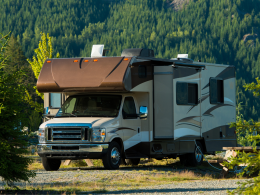There’s an old saying about how the only two things you can’t avoid are death and taxes. It’s one of those truisms that most people take for granted, as they generally pay their taxes and go about their lives.
But what if you left traditional, life-in-one-place living behind and turned to van life? Let’s take a closer look at what this life-changing decision means for your taxes.
Do You Have to Pay Taxes If You Live in a Van?
Unfortunately, living in a van doesn’t provide you with any special exemptions from paying taxes.
You won’t need to pay any property taxes or the corresponding amount as part of your rent. However, you’ll still have to pay sales taxes, if applicable.
Beyond this, you still must pay any local, state, and federal taxes on any income you receive. Failing to do so violates the law and could expose you to significant fines or, worse, prison time.

How to Pay Taxes as a Van Dweller
Still, you may wonder, “How do I know which taxes to pay if I travel from state to state without any real home base to return to?” It may take a few more steps, but those up for the challenge of van life can handle it just fine.
Establish Domicile in Your State of Choice
Regardless of where you park your van, you’re still technically a resident of one place.
Your domicile state could be the place you last lived before beginning your van life, or perhaps a parent or relative’s address where you can receive mail and unofficially “reside” while on the road.
While this may seem like a simple decision, it’s worth putting some thought into. If possible, it may be easiest to maintain residency in your previous home state.
However, other states offer unique benefits that often draw RVers and van lifers to declare residency there.
These benefits can vary from vehicle registration and licensing requirements to health insurance, and of course, state taxes.
Popular residency states like Florida, Texas, and South Dakota all have services that help you set up your legal life in your new “home state,” even if you never plan on setting down roots there.

File a Federal Tax Return
Just like you did when you lived in a house or apartment, you’ll still need to file a federal income tax return.
You can file yourself by hand, use one of many software services, or consult with an accountant if your tax situation is more complicated.
Make sure to file using your new state of residency address. This part of the process should be essentially the same as pre-van life tax filing.
File a State Tax Return in Your Domicile State
Here’s where things may differ. Instead of your previous home state, you’ll now file a state return in your new place of residency, if necessary.
Some states don’t have a state income tax, which means one fewer form for you to file. In either case, you repeat this process yearly until you end your van life adventures or pick a new state of residency.
File a Non-Resident Tax Return in Any Other State You Worked In
In certain situations, you must file state tax returns in your domicile state and in other states where you may have worked. This is where things can get a bit tricky.
Often, this isn’t necessary if you work remotely on the road for the same employer. But if you took jobs along the way like a campground host or any other in-person employment, you’ll need to file a return in that state if they have a state income tax.
This may still be true in certain other cases, so you may want to review your situation with a tax professional to ensure you meet all your legal obligations.

Van Life Tax Deductions
Van life isn’t just a great way to adventure around the country. It can also provide some unique and valuable tax benefits. Here are some of the most common.
Homeowner Tax Deductions
If your van qualifies as your primary residence, you can receive many of the same deductions you’d be entitled to with a regular house or condo.
However, the eligibility requirements include these three key things — a sleeping area, a cooking area, and toilet facilities. If you have those, you can take advantage of various valuable credits and deductions.
Loan Interest Deductions
Loan interest deductions might be the most significant one you can receive from using your van as your primary residence.
If you purchased your van using a loan, you could deduct the interest from your taxes, much like a regular homeowner can do with their mortgage interest. This could potentially save you thousands of dollars.
Sales Tax Deductions
In many states, those who buy an RV or trailer can deduct the sales tax from the purchase in the tax year you purchased it.
This is a one-time-only deduction, so don’t expect to receive continued benefits beyond your first year with your van. Still, it can provide a sizable help, especially just months after your purchase.
Business Deductions
Do you work from your van? Does your work require you to purchase materials, equipment, or drive to job sites? What about a phone or internet setup that you use for work?
If you answer yes to these questions, you may deduct some or all of these costs from your taxes.
The amount and allowability of these deductions may vary depending on your situation, so it’s best to consult a tax professional if you’re unclear.

Solar Tax Credit
Many van lifers rely on solar to enjoy a mostly off-grid lifestyle, without the need to plug into shore power every day. Unfortunately, the cost of purchasing and installing a solar system can be somewhat expensive.
However, the federal government offers tax credits to help offset some of these costs. Through 2024, you can claim a 26% credit on the overall cost of your system, as long as your van qualifies as your primary or secondary residence.
This solar tax credit could save you hundreds or even thousands — a welcome reward for going green and off-grid.
When in Doubt, Consult With a Tax Accountant
Let’s be real. Taxes can get complicated and stressful at times. Even worse, you can face big trouble for tax issues, whether accidental or deliberate.
We’re not tax professionals, and if you’re reading this, chances are you’re not either.
If you have a complicated tax situation, it’s best to get the advice of an expert. While you may not want to spend the extra money, the cost of a mistake could be far higher.
Additionally, an accountant may end up saving you money through deductions or credits you weren’t even aware of.
Pay Your Taxes by April 15th!
While van life may provide the freedom from routine and greater mobility you crave, that freedom doesn’t extend to taxes.
Van life or not, you still have the responsibility for paying taxes on any income you earned in the previous year by the same deadline as everyone else.
April 15th comes up quickly, so it’s best to get started as soon as you can — especially with a less-than-typical tax situation like van life.
If You Want the Latest Travel News, Join Our Mailing List
Don’t rely on biased RV industry news sources to keep you informed. Stick with Nomadic News. We publish articles and breaking stories that matter to you every weekday.










